TED演讲-健康的时间观念
ted如何掌控你的自由时间演讲稿

ted如何掌控你的自由时间演讲稿《TED 如何掌控你的自由时间演讲稿》尊敬的各位朋友:大家好!今天,我想和大家探讨一个我们都很关心的话题——如何掌控我们的自由时间。
在我们忙碌的生活中,常常会听到这样的抱怨:“我没时间!”“时间根本不够用!”但真的是这样吗?其实,我们并非没有时间,而是我们没有学会掌控时间。
首先,让我们思考一下,什么是自由时间?自由时间并不是指我们无所事事的闲暇时刻,而是指那些我们可以自主支配、用于追求我们真正热爱和认为重要的事情的时间。
很多时候,我们觉得自己忙碌不堪,没有自由时间,这是因为我们陷入了一种“时间贫困”的错觉。
我们总是被各种琐事、紧急但不重要的事情所占据,从而忽略了那些对我们来说真正重要的事情。
比如,我们可能会花费大量的时间在刷社交媒体、看无聊的电视剧或者参加一些无意义的社交活动上,而这些时间本可以用来学习新的技能、陪伴家人或者锻炼身体。
那么,如何打破这种困境,掌控我们的自由时间呢?第一步,我们需要明确自己的价值观和目标。
问问自己,什么对我来说是最重要的?是事业的成功?是家庭的幸福?是个人的成长?还是其他的什么?当我们明确了自己的价值观和目标,我们就能更容易地判断哪些事情是值得我们花费时间去做的,哪些事情是可以舍弃的。
举个例子,如果你的目标是成为一名优秀的作家,那么阅读、写作和参加相关的培训课程就应该成为你优先安排的事情。
而那些与写作无关的、纯粹消磨时间的活动,就可以适当地减少。
第二步,学会对不重要的事情说“不”。
这并不容易,因为我们往往害怕拒绝会让别人不高兴,或者担心错过一些机会。
但事实上,如果我们不学会拒绝,我们就会被别人的事情和要求所左右,从而失去对自己时间的掌控权。
比如,当有人邀请你参加一个你并不感兴趣的聚会时,你可以委婉地拒绝说:“很感谢你的邀请,但我已经有其他的安排了,希望下次有机会。
”不要觉得不好意思,要记住,你的时间是宝贵的,你有权决定如何使用它。
第三步,合理规划和安排时间。
ted如何掌控你的自由时间演讲稿

ted如何掌控你的自由时间演讲稿TED如何掌控你的自由时间TED演讲稿大家好,今天我要和大家分享的主题是“TED如何掌控你的自由时间”。
我们每个人都拥有24小时的时间,但有的人却能够做到高效利用时间,取得巨大成就,而有的人却总是感觉时间不够用,束手无策。
那么,让我们来看看TED是如何帮助我们掌控自由时间的。
第一部分:时间管理的重要性在讲述TED如何帮助我们掌控自由时间之前,我们首先要明白时间管理的重要性。
每个人的时间是有限的,如果我们不能合理地利用时间,就会导致工作效率低下、生活无序,甚至影响到身心健康。
因此,时间管理是我们追求高效生活的关键。
第二部分:TED演讲的特点TED作为一个全球知名的演讲平台,以其独特的演讲方式和丰富的主题吸引了成千上万的人关注。
下面,让我们来看看TED演讲的特点是什么。
1. 精彩短小的演讲时间TED演讲的时间限制一般为18分钟,这个时间对于演讲者来说是一种挑战,但也是一种机会。
演讲者必须在有限时间内准确表达自己的观点,这迫使他们专注于核心内容,去掉冗长的废话,使演讲更加精炼、简洁。
2. 强大的观众互动TED演讲注重与观众的互动,不仅是通过演讲者的表达方式,还包括演讲结束后的问答环节。
观众可以通过微笑、鼓掌、提问等方式与演讲者互动,这种互动能够激发出更多的启示和思考,让观众更深入地理解和吸收演讲内容。
3. 多元化的主题选择TED演讲涉及广泛的主题,涵盖科技、艺术、教育、领导力等各个领域,这使得我们可以从不同的角度来思考和看待问题。
不同的主题能够激发我们的创造力和思维方式,让我们在有限的时间内获得更多的启发。
第三部分:TED如何掌控你的自由时间现在,让我们来看看TED是如何帮助我们掌控自由时间的。
1. 短小精华的知识传递正如前面所提到的,TED演讲时间有限,演讲者必须在这有限的时间内将自己的观点传达给观众。
这使得演讲者必须选择性地呈现知识,只保留核心和重要的信息。
我们可以从中学到如何从庞杂的信息中提炼出关键和有价值的内容,避免陷入时间的浪费。
ted演讲自由时间管理
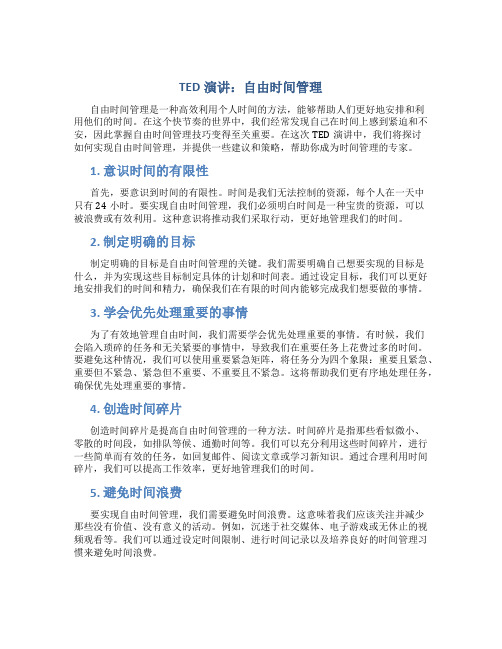
TED演讲:自由时间管理自由时间管理是一种高效利用个人时间的方法,能够帮助人们更好地安排和利用他们的时间。
在这个快节奏的世界中,我们经常发现自己在时间上感到紧迫和不安,因此掌握自由时间管理技巧变得至关重要。
在这次TED演讲中,我们将探讨如何实现自由时间管理,并提供一些建议和策略,帮助你成为时间管理的专家。
1. 意识时间的有限性首先,要意识到时间的有限性。
时间是我们无法控制的资源,每个人在一天中只有24小时。
要实现自由时间管理,我们必须明白时间是一种宝贵的资源,可以被浪费或有效利用。
这种意识将推动我们采取行动,更好地管理我们的时间。
2. 制定明确的目标制定明确的目标是自由时间管理的关键。
我们需要明确自己想要实现的目标是什么,并为实现这些目标制定具体的计划和时间表。
通过设定目标,我们可以更好地安排我们的时间和精力,确保我们在有限的时间内能够完成我们想要做的事情。
3. 学会优先处理重要的事情为了有效地管理自由时间,我们需要学会优先处理重要的事情。
有时候,我们会陷入琐碎的任务和无关紧要的事情中,导致我们在重要任务上花费过多的时间。
要避免这种情况,我们可以使用重要紧急矩阵,将任务分为四个象限:重要且紧急、重要但不紧急、紧急但不重要、不重要且不紧急。
这将帮助我们更有序地处理任务,确保优先处理重要的事情。
4. 创造时间碎片创造时间碎片是提高自由时间管理的一种方法。
时间碎片是指那些看似微小、零散的时间段,如排队等候、通勤时间等。
我们可以充分利用这些时间碎片,进行一些简单而有效的任务,如回复邮件、阅读文章或学习新知识。
通过合理利用时间碎片,我们可以提高工作效率,更好地管理我们的时间。
5. 避免时间浪费要实现自由时间管理,我们需要避免时间浪费。
这意味着我们应该关注并减少那些没有价值、没有意义的活动。
例如,沉迷于社交媒体、电子游戏或无休止的视频观看等。
我们可以通过设定时间限制、进行时间记录以及培养良好的时间管理习惯来避免时间浪费。
ted如何掌控你的自由时间演讲稿

ted如何掌控你的自由时间演讲稿《TED 如何掌控你的自由时间演讲稿》亲爱的朋友们:大家好!今天,我想和大家探讨一个我们都非常关心的话题——如何掌控我们的自由时间。
在我们忙碌的生活中,常常会听到这样的抱怨:“我没有时间做我想做的事。
”“时间根本不够用。
”但事实真的如此吗?我们先来思考一下,我们是如何看待时间的。
很多时候,我们把时间当作一种有限的资源,就像金钱一样,觉得用完了就没有了。
然而,时间和金钱有一个很大的不同。
金钱,如果你花掉了,它就真的没了。
但时间,无论你如何度过,它都会过去。
想象一下,有一个装满了弹珠的罐子,代表着你一生的时间。
每一颗弹珠就是一天。
当你度过一天,就从罐子里拿出一颗弹珠。
随着日子一天天过去,罐子里的弹珠越来越少。
但关键是,我们并不知道这个罐子到底有多大,我们也不知道还剩下多少弹珠。
这就是时间的不确定性。
那么,为什么我们总觉得没有时间呢?一个重要的原因是,我们把时间花在了那些看似紧急,但实际上并不重要的事情上。
比如说,不停地查看手机上的消息,或者沉迷于无意义的社交活动。
这些事情占据了我们大量的时间,却没有给我们带来真正的价值。
那么,如何改变这种状况呢?首先,我们需要明确自己的价值观和目标。
问问自己,什么对我来说是最重要的?是事业的成功?家庭的幸福?还是个人的成长?一旦明确了自己的价值观和目标,我们就可以根据它们来安排我们的时间。
比如说,如果你的目标是保持健康的身体,那么你就应该把时间花在锻炼和合理饮食上。
如果你的目标是提升自己的专业技能,那么你就应该每天抽出一定的时间来学习和实践。
接下来,学会拒绝那些不重要的事情。
这可能并不容易,因为我们常常害怕拒绝会让别人不高兴。
但请记住,你的时间是宝贵的,你有权决定如何使用它。
同时,我们要善于利用碎片时间。
很多人觉得碎片时间太短,做不了什么大事。
但其实,碎片时间也可以发挥很大的作用。
比如,在等公交车的时候,你可以听一段有声书;在排队的时候,你可以回复一封重要的邮件。
ted如何掌控你的自由时间演讲稿
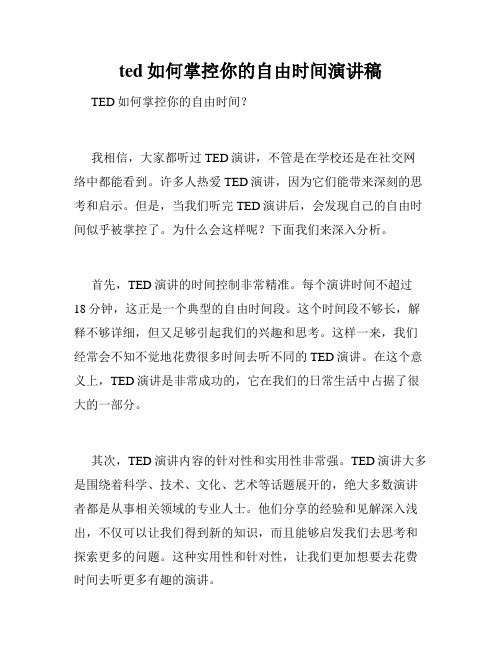
ted如何掌控你的自由时间演讲稿TED如何掌控你的自由时间?我相信,大家都听过TED演讲,不管是在学校还是在社交网络中都能看到。
许多人热爱TED演讲,因为它们能带来深刻的思考和启示。
但是,当我们听完TED演讲后,会发现自己的自由时间似乎被掌控了。
为什么会这样呢?下面我们来深入分析。
首先,TED演讲的时间控制非常精准。
每个演讲时间不超过18分钟,这正是一个典型的自由时间段。
这个时间段不够长,解释不够详细,但又足够引起我们的兴趣和思考。
这样一来,我们经常会不知不觉地花费很多时间去听不同的TED演讲。
在这个意义上,TED演讲是非常成功的,它在我们的日常生活中占据了很大的一部分。
其次,TED演讲内容的针对性和实用性非常强。
TED演讲大多是围绕着科学、技术、文化、艺术等话题展开的,绝大多数演讲者都是从事相关领域的专业人士。
他们分享的经验和见解深入浅出,不仅可以让我们得到新的知识,而且能够启发我们去思考和探索更多的问题。
这种实用性和针对性,让我们更加想要去花费时间去听更多有趣的演讲。
最后,TED演讲打破了时间和地域的限制。
每年TED会议都会邀请来自全球各个领域的人士,来分享自己的故事和见解。
而且TED会议也支持在线观看,这意味着无论你在哪里,只要有网络就能够欣赏到TED演讲的精华。
这种便利性和全球性,使得TED演讲成为了一个真正的文化现象,影响了数百万人的思想和生活方式。
总之,TED演讲的成功不仅在于它具有很高的质量和实用性,而且在于它成为了一个具有强烈影响力的文化现象。
这种现象不仅仅在TED演讲的时间内被体现出来,而且在我们的自由时间中也被深深地占据和影响着。
TED演讲如何掌控我们的自由时间?答案是,它通过时间控制、实用性和全球性成为了一个价值和思想的载体。
而我们,也因为这种价值和思想的影响而愿意将时间奉献给TED演讲。
最后,我想说的是,我们需要好好利用TED演讲,提高我们的自我认知和能力。
但同时,我们也需要好好管理好自己的自由时间,让自己的生活变得更加充实和有意义。
ted如何掌控你的自由时间演讲稿
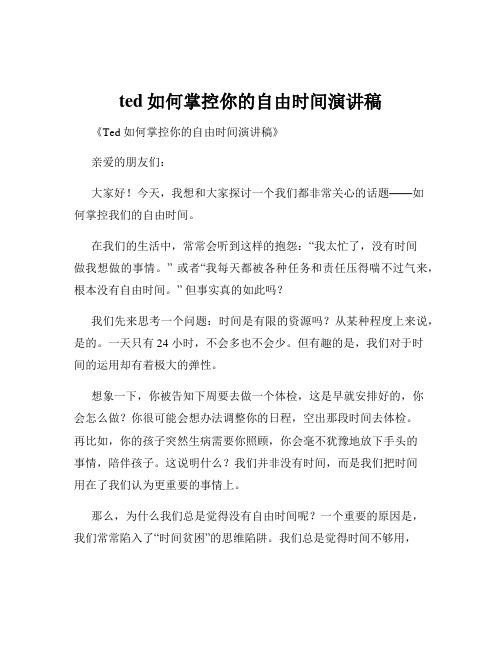
ted如何掌控你的自由时间演讲稿《Ted 如何掌控你的自由时间演讲稿》亲爱的朋友们:大家好!今天,我想和大家探讨一个我们都非常关心的话题——如何掌控我们的自由时间。
在我们的生活中,常常会听到这样的抱怨:“我太忙了,没有时间做我想做的事情。
” 或者“我每天都被各种任务和责任压得喘不过气来,根本没有自由时间。
” 但事实真的如此吗?我们先来思考一个问题:时间是有限的资源吗?从某种程度上来说,是的。
一天只有 24 小时,不会多也不会少。
但有趣的是,我们对于时间的运用却有着极大的弹性。
想象一下,你被告知下周要去做一个体检,这是早就安排好的,你会怎么做?你很可能会想办法调整你的日程,空出那段时间去体检。
再比如,你的孩子突然生病需要你照顾,你会毫不犹豫地放下手头的事情,陪伴孩子。
这说明什么?我们并非没有时间,而是我们把时间用在了我们认为更重要的事情上。
那么,为什么我们总是觉得没有自由时间呢?一个重要的原因是,我们常常陷入了“时间贫困”的思维陷阱。
我们总是觉得时间不够用,于是在忙碌中匆匆度过每一天,却没有停下来思考,我们真正想要的是什么,哪些事情对我们来说是最重要的。
那么,如何打破这种困境,掌控我们的自由时间呢?首先,我们要转变思维方式。
不要再把自己看作是时间的受害者,而是时间的管理者。
我们要认识到,我们总是有时间去做重要的事情,关键在于我们如何选择。
接下来,我们要明确自己的价值观和目标。
问问自己,在生活中,什么是最重要的?是事业的成功?是家庭的幸福?是个人的成长?还是健康和休闲?当我们清楚地知道自己的价值观和目标时,我们就能更容易地判断哪些事情值得我们花费时间,哪些事情可以舍弃。
然后,我们要学会对不重要的事情说“不”。
在生活中,我们常常面临各种各样的请求和诱惑,比如参加一个不太重要的聚会,或者接手一个不属于自己职责范围内的工作。
如果这些事情与我们的价值观和目标不符,我们要有勇气拒绝,这样才能为重要的事情腾出时间。
ted如何掌控你的自由时间演讲稿

ted如何掌控你的自由时间演讲稿自由时间是每个人都非常宝贵的资源,如何有效地掌控自己的时间,成为高效率的人,一直是备受关注的话题。
TED演讲是个极佳的平台,许多优秀的演讲者在TED上分享了他们的思考和经验。
在这篇文章中,我们将探讨TED演讲中关于如何掌控自由时间的思路和建议。
第一部分:自由时间的重要性自由时间是指个人在工作、学习之余拥有的时间,这段时间可以用于休息、娱乐或自我提升。
拥有合理安排的自由时间可以增加人们的幸福感,提高生活的质量。
然而,在现代社会中,越来越多的人感到自己的自由时间被压缩和挤占,这导致了压力和焦虑的增加。
第二部分:TED演讲的启示TED演讲中的许多演讲者通常都是职场精英或创业者,他们有自己独特的时间管理经验和心得。
在TED上,我们可以找到许多有关掌控自由时间的演讲视频,并从中总结出一些重要的观点。
1. 明确目标与优先级TED演讲者普遍认为,明确目标与优先级是高效利用自由时间的关键。
他们提倡将时间花在对个人和职业发展有最大价值的事情上,而不是被琐碎的事务所困扰。
通过设定明确的目标,并将其细化为具体的任务清单,可以帮助我们更好地管理时间。
2. 建立良好的习惯许多TED演讲者谈到了习惯的力量。
他们认为,建立良好的习惯有助于提高效率和节约时间。
例如,设定固定的作息时间、每天进行规划和反思等,都是帮助我们更好地掌握自由时间的好习惯。
3. 深度工作与休息间隔在特斯拉汽车公司的CEO埃隆·马斯克的TED演讲中,他提到了深度工作和休息间隔的重要性。
他强调了专注和高效工作的必要性,并提倡在每段工作时间后预留一定的休息时间,以提高工作效率。
这种工作和休息的循环可以帮助人们更好地控制自由时间,提高工作质量。
第三部分:个人实践与应用除了从TED演讲中获取启示,我们还可以根据自身实际情况,制定和应用适合自己的时间管理策略。
1. 设定明确的目标和计划:明确自己的长期目标和短期计划,将其细化为具体的任务清单,有助于我们合理安排自由时间。
ted如何掌控你的自由时间演讲稿

ted如何掌控你的自由时间演讲稿自由时间对每个人来说都非常珍贵。
然而,在现代社会中,我们常常感觉自己没有足够的时间去做自己喜欢的事情。
那么,如何才能有效地掌控自己的自由时间呢?在这个演讲稿中,我将分享Ted演讲中提到的一些方法和技巧,帮助大家更好地管理自己的时间。
首先,Ted建议我们要设定明确的目标。
明确的目标能够帮助我们更好地规划和分配时间。
当我们清楚知道自己想要实现什么时,我们就可以将时间和精力集中在重要的事情上,而不至于被琐碎的事情分散注意力。
因此,我建议大家在每天或每周的开始时,列出自己的目标清单,并通过不断地追求和调整目标来提高时间利用效率。
其次,Ted提到了“时间块”这一概念。
时间块是指将时间划分为较长的连续时间段,并将每个时间段用于专注于一项特定的任务或活动。
这种时间管理方法可以帮助我们避免过多地分心,提高工作和学习的效率。
例如,我们可以在早晨的时间块中专注于完成重要的工作任务,而在下午的时间块中留出时间与家人或朋友共度时光。
通过合理安排时间块,我们可以更好地平衡工作和生活。
此外,Ted还强调了“刻意练习”的重要性。
通过不断地反馈和调整,我们可以逐渐提高自己在特定领域的技能水平。
这样,我们在完成任务时所需的时间也会逐渐减少,从而腾出更多的自由时间。
因此,我建议大家在日常生活中寻找机会进行刻意练习,不断提升自己的技能和能力。
此外,Ted还提到了避免“感官过载”的重要性。
在现代社会,我们时常面对各种各样的信息和刺激,这往往会让我们感到精力不集中和时间不够用。
因此,我们应该学会有意识地减少对媒体和社交网络的过度依赖,避免让它们占据我们太多的时间和注意力。
相反,我们可以选择安排一些静心的活动,如读书、冥想等,来帮助我们重新调整和集中注意力。
最后,Ted提到了为自己的自由时间制定日程表的重要性。
制定日程表可以帮助我们更好地管理时间,提高效率。
我们可以将日常任务和活动按照优先级和时间要求进行排列,并合理地安排时间块,以确保我们有足够的时间来完成重要的任务,并留出一些自由时间来放松和休息。
TED演讲健康的时间观念

Life is temptation.It\'s all about yielding, resisting, yes, no, now, later, impulsive, reflective,present focus and future focus.Promised virtues fall prey to the paions of the moment.Of teenage girls who pledged seual abstinence and virginity until marriage -- thank you George Bush -- the majority, 60 percent, yielded to seual temptations within one year.And most of them did so without using birth control.So much for promises.Walter Mischel, my colleague at Stanford, went back 14 years later, to try to discover what was different about those kids.There were enormous differences between kids who resistedand kids who yielded, in many ways.The kids who resisted scored 250 points higher on theSAT.That\'s enormous.That\'s like a whole set of different IQ points.They didn\'t get in as much trouble.They were better students.They were self-confident and determined.And the key for me today, the key for you, is, they were future-focused rather than present-focused.What determines any decision you make? You make a decision on which you\'re going to base an action.For some people it\'s only about what is in the immediate situation, what other people are doing and what you\'re feeling.And those people, when they make their decisions in that format -- we\'re going to call them \"present-oriented,\" because their focus is what is now.For others, the present is irrelevant.It\'s always about \"What is this situation like thatI\'veeperienced in the past?\" So that their decisions are based on past memories.And we\'re going to call those people \"past-oriented,\" because they focus on what was.For others it\'s not the past, it\'s not the present, it\'s only about the future.Their focus is always about anticipated consequences.Cost-benefit analysis.We\'re going to call them \"future-oriented.\" Their focus is on what will be.future.And moderate on present-hedonism.And always low on past-negative and present-fatalism.So the optimal temporal mi is what you get from the past -- past-positive gives you roots.You connect your family, identity and your self.What you get from the future is wings to soar to new destinations, new challenges.What you get from the present hedonism is the energy, the energy to eplore yourself, places, people, sensuality.And it resonated for me.I grew up as a poor kid in the South Bron ghetto, a Sicilian family -- everyone lived in the past and present.I\'m here as a future-oriented person who went over the top, who did all these sacrifices because teachers intervened, and made me future oriented.Told me don\'t eat that marshmallow, because if you wait you\'re going to get two of them, until I learned to balance out.I\'ve added present-hedonism, I\'ve added a focus on thepast-positive, so, at 76 years old, I am more energetic than ever, more productive, and I\'m happier than I have ever been.perspective and that of others.And the idea is so simple, so obvious, but I think the consequences are really profound.Thank you so much.(Applause)《健康的时间观念.doc》。
健康的时间观念演讲稿

健康的时间观念演讲稿尊敬的各位领导、老师以及亲爱的同学们:大家好!我很荣幸能够站在这里,给大家演讲。
今天,我要与大家探讨的主题是健康的时间观念。
时间,对于每个人来说都是非常宝贵而又不可逆转的。
但是,我们是否在意过我们的时间观念对我们的健康有着重要的影响呢?首先,让我们思考一下:什么是健康的时间观念?我认为健康的时间观念是合理规划时间、高效利用时间、充实度过时间,以及懂得珍惜时间等等。
一个拥有健康时间观念的人,不仅能够更好地管理自己的时间,提高工作和学习效率,还能够保持身心健康,拥有更加充实而愉快的生活。
正确认识时间的价值和限制非常重要。
时间是有限的资源,每个人的一天只有24小时,不管你是世界首富还是一名普通的学生,我们在时间的面前都是平等的。
明白时间的限制,才能更加懂得去合理规划和利用时间。
我们需要制定一个合理的时间表,将时间分配给各项任务和活动。
这样一来,我们就能够避免拖延症的出现,保证每一天能够高效、有序地完成自己的计划。
然而,合理规划时间并不仅仅是完成任务,还需要我们关注时间的质量。
我们需要明确自己的目标,将重要的事情放在优先级更高的位置。
我们应该将时间用于学习、锻炼、休息和充电等方面,以提高自己的综合素质和能力。
只有将时间分配得当,并专注于健康的方向,才能够真正提高自己的生活质量。
实现健康的时间观念,还需要我们学会珍惜时间。
我们生活在一个快节奏的社会,各种诱惑和分散注意力的事物充斥着我们的生活。
在这个信息爆炸的时代,我们时常会被无意义的娱乐活动所困扰,从而浪费大量的时间。
然而,时间是不可逆转的,我们每浪费一分钟,就少了一分钟的机会去做更有意义的事情。
因此,我们要提高时刻警醒自己,懂得及时制止自己的消耗行为,珍惜每一分每一秒的时光。
除了合理规划和高效利用时间,充实度过时间也是健康时间观念的重要组成部分。
充实度过的时间不仅指在学习和工作中取得成就,还包括培养兴趣爱好、与朋友分享快乐、参与公益活动等等。
TED演讲--如何掌控你的自由时间

TED演讲--如何掌控你的自由时间第一篇:TED演讲--如何掌控你的自由时间How to Manage Your Free Time When people find out I write about time management, Theyassume two things.One is that I'm always on time, and I'm not.I have four small children, and I would like to blame them for my occasional tardiness, but sometimes it's just not their fault.I was once late to my own speech on time management.We all had to just take a moment together and savor that irony.The second thing they assume is that I have lots of tips and tricks for saving bits of time here and there.Sometimes I'll hear from magazines that are doing a story along these lines, generally on how to help their readers find an extra hour in the day.And the idea is that we'll shave bits of time off everyday activities, add it up, and we'll have time for the good stuff.I question the entire premise of this piece, but I'm always interested in hearing what they've come up with before they call me.Some of my favorites: doing errands where you only have to make right-hand turns、Being extremely judicious in microwave usage: it says three to three-and-a-half minutes on the package, we're totally getting in on the bottom side of that.And my personal favorite, which makes sense on some level, is to DVR your favorite shows so you can fast-forward through the commercials.That way, you save eight minutes every half hour, so in the course of two hours of watching TV, you find 32 minutes to exercise.Which is true.You know another way to find 32 minutes to exercise? Don't watch two hours of TV a day, right? Anyway, the idea is we'll, save bits of time here and there, add it up, we will finally get to everything we want to do.But after studying how successful people spend their time and looking attheir schedules hour by hour, I think this idea has it completely backward.We don't build the lives we want by saving time.We build the lives we want, and then time saves itself.Here's what I mean.I recently did a time diary project looking at 1,001 days in the lives of extremely busy women.They had demanding jobs, sometimes their own businesses, kids to care for, maybe parents to care for, community commitments...busy, busy people.I had them keep track of their time for a week, so I could add up how much they worked and slept, and I interviewed them about their strategies, for my book.One of the women whose time log I studied...she goes out on a Wednesday night for something.She comes home to find that her water heater has broken, and there is now water all over her basement.If you've ever had anything like this happen to you, you know it is a hugely damaging, frightening, sopping mess.So she's dealing with the immediate aftermath that night, next day she's got plumbers coming in, day after that, professional cleaning crew dealing with the ruined carpet.All this is being recorded on her time log.Winds up taking seven hours of her week.Seven hours.That's like finding an extra hour in the day.But I'm sure if you had asked her at the start of th e week, “Could you find seven hours to train for a triathlon?” “Could you dind seven hours to mentor seven worthy people?” I'm sure she would've said what most of us would've said, which is, “No...can't you see how busy I am?” Yet when she had to find seven hours because there is water all over her basement, she found seven hours.And what this shows us is that time is highly elastic.We cannot make more time, but time will stretch to accommodate what we choose to put into it.And so the key to time management is treating our priorities as the equivalent of that broken water heater.To get at this, I like to use language fromone of the busiest people I ever interviewed.By busy,I mean she was running a small business with 12 people on the payroll,she had six children in her spare time.I was getting in touch with her to set up an interview on how she “had it all”...that phrase.I remember it was a Thursday morning,and she was not available to speak with me.Of course,right? But the reason she was unavailable to speak with me is that she was out for a hike,because it was a beautiful spring morning,and she wanted to go for a hike.So of course this makes me even more intrigued,and when I finally do catch up with her,she explains it like this.She says,“Listen Laura,every thing I do,every minute I spend,is my choice.”And rather than say,“I don't have time to do x,y or z,”she'd say,“I don't do x,y or z because it's not a priority.”“I don't have time,”often means“It's not a priority.”If you think about it,that's really more accurate language.I could tell you I don't have time to dust to dust my blinds,but that's not true.If you offered to pay me $100,000 to dust my blinds,I would get to it pretty quickly.Since that is not going to happen,I can acknowledge this is not a matter of lacking time,it's that I don't want to do ing this language reminds us that time is a choice.And granted,there may be horrible consequences for making different choices,I will give you that.But we are smart people,and certainly over the long run,we have the power to fill our lives with the things that deserve to be there.So how do we do that?How do we treat our priorities as the equivalent of that broken water heater? Well,first we need to figure out what they are.I want to give you two strategies for thinking about this.The first,on the professional side:I'm sure many people coming up to the end of the year are giving or getting annual performance reviews.You look back over your successes over the year,your“opportunities for growth.”And this serves its purpose,but I find it's more effective to do this looking forward.So I want you to pretend it's the end of next year.You're giving yourself a performance review(绩效评估),and it has been an absolutely amazing year for you professionally.Write next year's review:What 3-5 things would make it a great year for you professionally.So you can write next year's performance review now.And you can do this for your personal life,too.I'm sure many of you,like me,come December,get cards that contain these folded up sheets of colored paper,on which written what is known as the family holiday letter.Bit of a wretched genre of literature,really,going on about how amazing everyone in the household is,or even more scintillating,how busy everyone in the household is.But these letters serve a purpose,which is that they tell your friends and family what you did in your personal life that mattered to you over the year.So this year's kind of done,but I want you to pretend it's the end of next year,and it has been an absolutely amazing year for you and the people you care about.Write the family hollday letter:What three to five things did you do that made it so amazing?So you can write next year's family holiday letter now.Don't send it.Please,don't send it.But you can write it.And now,between the performance review and the family holiday letter,we have a list of six to ten goals we can work on in the next year.And now we need to break these down into doable steps.So maybe you want to write a family history.First,you can read some other family histories,get a sense for the style.Then maybe think about the questions you want to ask your relatives,set up appointments to interview them.Or maybe you want to run a 5K.So you need to find a race and sign up,figure out a training plan,and dig those shoes out of the backof the closet.And then...this is key...we treat our priorities as the equivalent of that broken water heater,by putting them into our schedules first.We do this by thinking through our weeks before we are in them,I find a really good time to do this is Friday afternoons.Friday afternoon is what an economist might call a “low opportunity cost” time.Most of us are not sitting there on Friday afternoons saying,“I am excited to make progress toward my personal and professional prio rities right now.”But we are willing to think about what those should be.So take a little bit of time Friday afternoon,make yourself a three-category priority list:career,relationships,self.Making a three-category list reminds us that there should be something in all three categories.Career,we think about;relationships,self...not so much.But anyway,just a short list,two to three items in each.Then look out over the whole of the next week,and see where you can plan them in.Where you plan them in is up to you.I know this is going to be more complicated for some people than others.I mean,some people's lives are just harder than others.It is not going to be easy to find time to take that poetry class if you are caring for multiple children on your own.I get that.And I don't want to minimize anyone's struggle.But I do think that the numbers I am about to tell you are empowering.There are 168 hours in a week.Twenty-four times seven is 168 hours.That is a lot of time.If you are working a full-time job,so 40 hours a week,sleeping eight hours a night,so 56 hours a week...that leaves 72 hours for other things.That is a lot of time.You say you're working 50 hours a week,maybe a main job and a side hustle.Well,that leaves 62 hours for other things.You say you're working 60 hours.Well,that leaves 52 hours for other things.You say you're working more than 60 hours.Well,are you sure?Therewas once a study comparing people's estimated work weeks with time diaries.They found that people claiming 75-plus-hour work weeks were off by about 25 hours.You can guess in which direction,right?Anyway,in 168 hours a week,I think we can find time for what matters to you.If you want to spend more time with your kids,you want to study more for a test you're taking,you want to exercise for three hours and volunteer for two,you can.And that's even if you're working way more than full-time hours.So we have plenty of time,which is great,because guess what? We don't even need that much time to do amazing things.But when most of us have bits of time,what do we do?Pull out the phone,right?Start deleting emails.Otherwise,we're puttering around the house or watching TV.But small moments can have great power.You can use your bits of time for bits of joy.Maybe it's choosing to read something wonderful on the bus on the way to work.I know when I had a job that required two bus rides and a subway ride every morning,I used to go to the library on weekends to get stuff to read.It made the whole experience almost,almost, enjoyable.Breaks at work can be used for meditating or praying.If family dinner is out because of your crazy work schedule,maybe family breakfast could be a good substitute.It's about looking at the whole of one's time and seeing where the good stuff can go.I truly believe this,there is time.Even if we are busy,we have time for what matters.And when we focus on what matters,we can build the lives we want in the time we've got.第二篇:(TED英文演讲)如何掌控你的自由时间——观后感“How to control your free time?”--------Feedback According to the speaker, the key to time management is not just use your fragmented time, but make use of time as planned withyour aim.As the speaker said, “We don’t build the lives we want by saving time, we build the lives we want, and than time saves itself.” Perhaps you may be more exhausted on account of full of activities on your schedule.This is what the speaker pointed out that the traditional idea had completely been out of fashion.Time is highly elastic.Everything you do, every minute you spend, is your choice.You should build your aims so that you do things in your direction, then time can be fully taken advantage of.Well, the methods of time management the speaker told us could be divided into three steps.First of all, look forward to future and set up your new goals, which should be into small pieces and put the most essential on the top of your schedule.Secondly, find time for what matters to you, accomplish them in the order of priority.Third, it’s a good choice for you to free yourself in your fragmented time.Finally, I’d like to quo te the speaker’s final words.“There is time.Even if we are busy, we have time for what matters.And when we focus on what matters, we can build the lives we want in the time we got.”第三篇:《心灵鸡汤·别让时间掌控你》读后感《心灵鸡汤·别让时间掌控你》读后感《心灵鸡汤·别让时间掌控你》读后感《心灵鸡汤·别让时间掌控你》读后感如果你没有看过《心灵鸡汤》,那么我建议你有时间去细细“品尝”;如果你看过,请再次“回味”。
时间ted演讲稿

时间ted演讲稿尊敬的评委们,亲爱的观众们,大家好!我今天在这里非常荣幸能够分享关于时间的演讲。
时间是我们生活中非常宝贵的资源,它不可逆转,一旦流逝就无法再回来。
因此,我们每个人都应该充分珍惜并善于利用我们的时间。
首先,时间是公平的。
无论是富人还是穷人,成功人士还是平凡人,每个人每天都只有24小时。
事实上,时间是我们最公平的财富。
成功的关键在于如何有效地利用这24小时。
我们可以选择抱怨自己没有足够的时间,或者我们可以学会管理时间,做出明智的选择和决策。
其次,时间是宝贵的。
像我们每个人一样,你我都曾经有过后悔的时刻。
后悔曾经浪费的时间是非常常见的情况。
我们可能会后悔没有充分利用青春年华,没有充实自己的技能和知识,或者没有花更多时间陪伴亲人和朋友。
时间是我们生活中最珍贵的资源,所以我们必须明确目标,制定计划,并将时间用于实现我们的梦想。
最后,时间是可控的。
虽然我们无法控制时间的流逝,但我们可以控制如何使用我们的时间。
时间管理是成功的关键。
我们可以通过制定日程安排和设定优先级来确保我们在正确的时间做正确的事情。
此外,我们还可以学会放松和休息,以保持健康的身心状态,提高工作效率。
在结束演讲之前,我想分享一句名言:“时间会告诉我们谁在说谎,谁是真心。
”时间是真理的见证者,它将揭示我们生活中的真实面孔。
因此,我们应该尽力利用每一刻的时间来追求自己的梦想,实现自己的目标,并成为一个真实、坚韧且有价值的个体。
在结束之前,我要呼吁大家珍惜时间,学会有效管理时间,并充分利用每一刻来追求自己的梦想和目标。
让我们一起努力,用我们的时间来改变世界吧!谢谢大家!。
ted珍惜时间演讲稿小学

ted珍惜时间演讲稿小学尊敬的老师、亲爱的同学们:大家好!我今天要给大家分享的题目是《珍惜时间》。
时间是我们生命中最宝贵的财富之一,它是一种无法回收的资源,也是唯一不容忽视的事物。
然而,在我们的日常生活中,我们往往没有意识到时间的重要性,我们浪费了太多宝贵的时间。
首先,让我们思考一下我们日常生活中常常浪费时间的地方。
你是否经常迟到?你是否常常在电视、电脑或手机上花费过多时间?你是否常常拖延做作业或者完成任务?这些都是我们常常会犯的错误。
我们应该明白,迟到不仅会浪费我们自己的时间,还会浪费别人的时间。
而花费太多时间在电视、电脑或手机上,会使我们忽视其他更重要的事情,如学习和与家人朋友的交流。
而拖延做作业或完成任务,会使我们失去宝贵的学习时间。
那么,我们应该如何珍惜时间呢?首先,我们要时刻珍惜时间。
每天,我们都应该清楚地知道自己的目标和任务,并有计划地安排好自己的时间。
我们可以制定一个时间表,包括学习时间、娱乐时间、运动时间等。
在这个时间表里,我们要严格按计划完成任务,不要拖延。
我们要做到高效率地学习和工作,不要浪费时间。
其次,我们要优先处理重要的事情。
在我们的日常生活中,总会有一些事情是很重要的,比如学习、做作业、锻炼等。
我们要明确重要事务的优先级,先处理重要的事情,再考虑其他琐碎的事情。
同时,我们还要学会分析事情的紧急性,处理一些紧急的事情,以免影响我们的学习和工作进度。
最后,我们要充分利用碎片化的时间。
在我们生活中,有很多零散的时间段,比如上学路上、排队等待等。
这些时间虽然很短暂,但如果善于利用起来,可以大大提高我们的效率。
我们可以把这些碎片化的时间用来回顾学习内容、默写知识点等,让时间不再被浪费。
亲爱的同学们,时间是公平的,每个人一天只有24小时。
但是,我们可以决定我们如何利用这24小时。
如果我们能够珍惜时间,科学安排自己的时间,高效利用每一分每一秒,我们将能够获得更多的成就,实现更大的梦想。
ted珍惜时间演讲稿小学

ted珍惜时间演讲稿小学《ted 珍惜时间演讲稿小学》亲爱的同学们:大家好!今天我站在这里,想和大家聊聊一个非常重要的话题——珍惜时间。
时间是什么?时间就像一个看不见、摸不着的精灵,它悄悄地从我们身边溜走,从不等待任何人。
我们每天早上起床,开始新的一天,时间就开始流逝;我们上课、玩耍、吃饭、睡觉,时间一刻也不停歇。
有时候,我们可能会觉得时间过得很慢,比如等待下课铃声响起的时候;但更多的时候,我们会发现时间过得飞快,一天、一周、一个月,甚至一年,就这样不知不觉地过去了。
同学们,你们有没有想过,如果我们不珍惜时间,会怎么样呢?如果我们浪费时间,就会错过很多学习的机会。
比如说,上课的时候不认真听讲,偷偷做小动作或者和同学说话,这短短的几十分钟就浪费了。
回到家做作业的时候,如果一边玩一边写,几个小时过去了,作业还没完成,这也是在浪费时间。
时间一去不复返,我们浪费的每一分每一秒,都再也回不来了。
等到考试的时候,才发现很多知识都没掌握,成绩不理想,这时候后悔已经来不及了。
如果我们不珍惜时间,还可能会错过很多美好的事情。
比如和家人一起出去玩的机会,和朋友一起做游戏的快乐时光。
因为我们总是觉得还有时间,以后再说,结果等到真正想要去做的时候,发现已经没有机会了。
那么,我们应该怎样珍惜时间呢?首先,我们要给自己制定一个合理的计划。
每天早上起床后,想一想今天要做哪些事情,把它们按照重要程度和紧急程度排个序。
先完成重要又紧急的事情,比如完成老师布置的作业;然后再做重要但不紧急的事情,比如阅读课外书籍、锻炼身体。
这样,我们就能有条不紊地利用时间,不会手忙脚乱。
其次,我们要学会集中注意力。
做事情的时候,要一心一意,不要三心二意。
比如写作业的时候,就把电视关掉,把手机放一边,专心致志地写。
这样可以提高我们做事的效率,节省很多时间。
另外,我们还要充分利用零碎的时间。
比如在上学的路上,可以背一背单词;排队的时候,可以想一想数学题;睡觉前,可以读一篇小故事。
ted 有效的时间管理

TED 有效的时间管理摘要时间是我们最宝贵的资源之一,然而,我们常常感到时间不够用。
TED演讲为我们提供了一些关于如何有效管理时间的有用技巧和策略。
本文将介绍一些TED 演讲中提到的有效时间管理的方法,包括制定优先事项、提高工作效率和减少时间浪费等方面的建议。
1. 制定优先事项时间管理的关键是明确自己的优先事项。
在一场TED演讲中,演讲者提到,我们应该将时间看作一种资源,就像我们对待金钱一样。
我们不能无限制地使用金钱,而应该明确自己的开销和储蓄计划。
同样,我们也不能无限制地使用时间,我们需要明确自己的优先事项并制定一个合理的计划来管理时间。
为了制定优先事项,一个常用的工具是时间日志。
通过记录自己每天的时间使用情况,我们可以更好地了解自己的时间花费在哪些领域上。
通过分析时间日志,我们可以识别出时间浪费的地方,并找出提高效率的方法。
当我们明确了自己的优先事项后,我们可以使用时间框架来帮助我们更好地管理时间。
时间框架是一种将时间划分为不同的区块,并为每个区块分配特定任务的方法。
通过时间框架,我们可以更好地安排我们的日程,并确保我们有足够的时间来完成重要的任务。
2. 提高工作效率提高工作效率是有效时间管理的关键。
在一场TED演讲中,讲者提到了一些提高工作效率的方法。
首先,我们可以使用番茄工作法。
番茄工作法是一种时间管理技术,它将工作划分为25分钟的工作块,每个工作块之后有5分钟的休息时间。
通过将工作划分为短时间段,我们可以更好地集中注意力,并以高效的方式完成任务。
除了番茄工作法,另一个重要的方法是避免多任务处理。
虽然我们常常以为多任务处理可以提高效率,但实际上,它只会分散我们的注意力,导致任务完成时间延长。
相反,集中注意力在一个任务上,并在完成之后再转向另一个任务,可以提高工作效率。
另外,设置固定时间来回答电子邮件和社交媒体也是提高工作效率的关键。
我们常常陷入电子邮件和社交媒体的泥沼中,导致时间浪费。
通过设置固定的时间来处理这些事项,我们可以避免过度分心,并将更多时间用于重要的任务上。
时间 ted演讲稿

时间 ted演讲稿
时间 TED演讲稿。
大家好,我是今天的演讲者。
今天我想和大家分享的主题是时间。
时间是一个非常神奇的存在,它无声无息地流逝,却又影响着我们每个人的生活。
我们常常感叹时间过得太快,或者太慢,但其实时间本身是没有速度的。
它只是一个概念,却又牵动着我们的情感和生活。
首先,让我们来思考一下时间的珍贵。
时间是一种资源,它是有限的。
我们每个人在这个世界上的时间都是有限的,所以我们应该珍惜每一分每一秒。
我们不能浪费时间,因为时间一旦流逝就无法回头。
我们要珍惜时间,珍惜和家人朋友在一起的时光,珍惜学习工作的时间,珍惜每一个可以让自己成长的机会。
其次,让我们来思考一下时间的力量。
时间可以改变一切。
它可以冲淡悲伤,治愈创伤,也可以让我们变得更加成熟。
时间是一种疗伤的良药,它可以让我们从失败中学到教训,从挫折中变得更加坚强。
所以,当我们遇到困难和挫折的时候,不要气馁,因为时间会带给我们力量和勇气。
最后,让我们来思考一下时间的管理。
时间管理是非常重要的,它可以让我们更加高效地利用时间,让我们的生活变得更加充实。
我们可以通过制定计划,合理安排时间,来提高工作和学习的效率。
同时,我们也要学会放慢脚步,享受生活,不要让时间成为我们生活的枷锁,而是让时间成为我们生活的伙伴。
总之,时间是非常宝贵的,我们要珍惜时间,学会利用时间,让时间成为我们生活的朋友。
谢谢大家。
以上就是我今天想和大家分享的关于时间的一些想法。
希望这些想法能够对大家有所启发。
谢谢。
TED演讲:如何掌控你的空闲时间

TED演讲:如何掌控你的空闲时间有时候是不是总是觉得自己时间不够,如今的个人时间越来越碎片化,而想要快速的成长那得多多合理的利用自己的时间。
今天推荐给你的是Laura Vanderkam的关于空闲时间的演讲,看看她对此的独特见解,希望对你有帮助。
中英文对照翻译When people find out I write about time management, they assume two things. One is that I'm always on time, and I'm not. I have four small children, and I would like to blame them for my occasional tardiness,当人们发现我写关于时间管理的文章时,他们都会假设两件事:第一,我永远都准时,但我并不是。
我有四个小孩,我偶尔将迟到归咎于他们,but sometimes it's just not their fault. I was once late to my own speech on time management.We all had to just take a moment together and savor that irony.不过有时候真的不是因为他们。
我有一次在去我的一个关于时间管理的演讲时迟到了。
我们都需要一点时间去好好地体味一下这有多么讽刺。
The second thing they assume is that I have lots of tips and tricks for saving bits of time here and there.Sometimes I'll hear from magazines that are doing a story along these lines, generally on how to help their readers find an extra hour in the day.第二,人们总是假设我有很多关于如何节省时间的贴士和技巧。
健康ted演讲稿
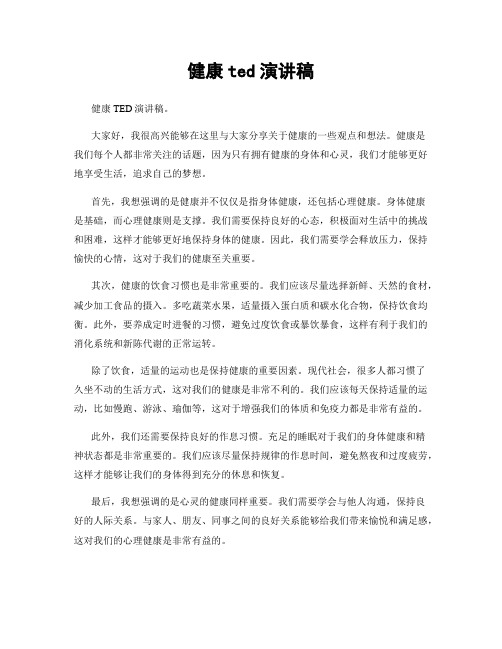
健康ted演讲稿健康TED演讲稿。
大家好,我很高兴能够在这里与大家分享关于健康的一些观点和想法。
健康是我们每个人都非常关注的话题,因为只有拥有健康的身体和心灵,我们才能够更好地享受生活,追求自己的梦想。
首先,我想强调的是健康并不仅仅是指身体健康,还包括心理健康。
身体健康是基础,而心理健康则是支撑。
我们需要保持良好的心态,积极面对生活中的挑战和困难,这样才能够更好地保持身体的健康。
因此,我们需要学会释放压力,保持愉快的心情,这对于我们的健康至关重要。
其次,健康的饮食习惯也是非常重要的。
我们应该尽量选择新鲜、天然的食材,减少加工食品的摄入。
多吃蔬菜水果,适量摄入蛋白质和碳水化合物,保持饮食均衡。
此外,要养成定时进餐的习惯,避免过度饮食或暴饮暴食,这样有利于我们的消化系统和新陈代谢的正常运转。
除了饮食,适量的运动也是保持健康的重要因素。
现代社会,很多人都习惯了久坐不动的生活方式,这对我们的健康是非常不利的。
我们应该每天保持适量的运动,比如慢跑、游泳、瑜伽等,这对于增强我们的体质和免疫力都是非常有益的。
此外,我们还需要保持良好的作息习惯。
充足的睡眠对于我们的身体健康和精神状态都是非常重要的。
我们应该尽量保持规律的作息时间,避免熬夜和过度疲劳,这样才能够让我们的身体得到充分的休息和恢复。
最后,我想强调的是心灵的健康同样重要。
我们需要学会与他人沟通,保持良好的人际关系。
与家人、朋友、同事之间的良好关系能够给我们带来愉悦和满足感,这对我们的心理健康是非常有益的。
总的来说,健康是我们生活中非常重要的一部分,我们应该从多个方面来关注和维护我们的健康。
只有拥有健康的身体和心灵,我们才能够更好地享受生活,追求自己的梦想。
希望大家能够从现在开始,更加重视自己的健康,让健康成为我们生活中最重要的财富。
谢谢大家!。
ted演讲时间管理
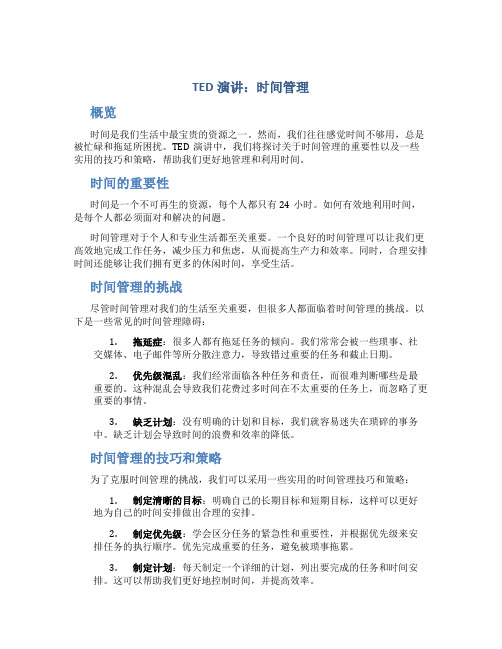
TED演讲:时间管理概览时间是我们生活中最宝贵的资源之一。
然而,我们往往感觉时间不够用,总是被忙碌和拖延所困扰。
TED演讲中,我们将探讨关于时间管理的重要性以及一些实用的技巧和策略,帮助我们更好地管理和利用时间。
时间的重要性时间是一个不可再生的资源,每个人都只有24小时。
如何有效地利用时间,是每个人都必须面对和解决的问题。
时间管理对于个人和专业生活都至关重要。
一个良好的时间管理可以让我们更高效地完成工作任务,减少压力和焦虑,从而提高生产力和效率。
同时,合理安排时间还能够让我们拥有更多的休闲时间,享受生活。
时间管理的挑战尽管时间管理对我们的生活至关重要,但很多人都面临着时间管理的挑战。
以下是一些常见的时间管理障碍:1.拖延症:很多人都有拖延任务的倾向。
我们常常会被一些琐事、社交媒体、电子邮件等所分散注意力,导致错过重要的任务和截止日期。
2.优先级混乱:我们经常面临各种任务和责任,而很难判断哪些是最重要的。
这种混乱会导致我们花费过多时间在不太重要的任务上,而忽略了更重要的事情。
3.缺乏计划:没有明确的计划和目标,我们就容易迷失在琐碎的事务中。
缺乏计划会导致时间的浪费和效率的降低。
时间管理的技巧和策略为了克服时间管理的挑战,我们可以采用一些实用的时间管理技巧和策略:1.制定清晰的目标:明确自己的长期目标和短期目标,这样可以更好地为自己的时间安排做出合理的安排。
2.制定优先级:学会区分任务的紧急性和重要性,并根据优先级来安排任务的执行顺序。
优先完成重要的任务,避免被琐事拖累。
3.制定计划:每天制定一个详细的计划,列出要完成的任务和时间安排。
这可以帮助我们更好地控制时间,并提高效率。
4.使用工具和技术:现代科技为我们提供了许多时间管理的工具和技术,如时间管理应用程序、待办事项清单、提醒功能等。
合理利用这些工具和技术可以帮助我们更好地管理时间。
5.避免过度承诺:我们往往不敢拒绝他人的请求,结果导致自己承担了过多的工作和项目。
ted时间管理中文稿

TED时间管理中文稿引言时间是我们每个人都珍贵的资源,如何合理管理时间并提高工作效率是现代人面临的一个重要问题。
TED Talks作为一个全球知名的演讲平台,为我们提供了许多关于时间管理的精彩演讲。
本文将介绍一些TED Talks中关于时间管理的观点和方法,帮助读者掌握更好地管理时间的技巧,提高效率。
1. 时间管理的重要性时间管理是指合理安排和利用时间的能力,对个人和组织而言都具有重要意义。
在TED Talk《如何掌控时间?》中,演讲者劳拉·范德坎普指出,时间管理不仅可以提高工作和生活的效率,还可以减少压力和提升幸福感。
她提出了“拥抱焦虑”的观点,即通过合理规划时间,我们可以减少待办事项的紧迫感,从而更好地应对挑战和压力。
2. 设置目标和优先级在TED Talk《时间管理的秘诀》中,演讲者朱丽娅·加尔多内提到了设置目标和优先级的重要性。
她认为,时间管理的第一步是明确自己的目标,然后将目标分解为具体的任务,并按照优先级进行排序。
与此同时,她还强调了将时间用在最有价值的事情上的重要性,而不是被琐事所困扰。
3. 集中注意力与避免干扰在现代社会,我们经常遭遇各种干扰,如社交媒体、电子邮件等。
在TED Talk 《重塑你的时间观念》中,演讲者梅里维亚·埃实特强调了集中注意力和避免干扰的重要性。
她提出了“番茄钟”方法,即将时间划分为25分钟的工作时间段,每段时间结束后休息5分钟。
通过这种方式,我们可以增强注意力,提高工作效率。
4. 学会说“不”在TED Talk《放空时间的重要性》中,演讲者斯图·沃思提到了学会说“不”的重要性。
他认为,我们常常因为害怕错过任何机会而接受了太多的任务和约束,导致时间被过度分散。
因此,学会拒绝那些不对自己有利或不是自己优势所在的事情,是一个重要的时间管理技巧。
5. 理解自己的生物钟在TED Talk《了解你的内在时钟》中,演讲者吉姆·迪含尼提到了了解自己的生物钟的重要性。
- 1、下载文档前请自行甄别文档内容的完整性,平台不提供额外的编辑、内容补充、找答案等附加服务。
- 2、"仅部分预览"的文档,不可在线预览部分如存在完整性等问题,可反馈申请退款(可完整预览的文档不适用该条件!)。
- 3、如文档侵犯您的权益,请联系客服反馈,我们会尽快为您处理(人工客服工作时间:9:00-18:30)。
Philip Zimbardo: The psychology of timeI want to share with you some ideas about the secret power of time, in a very short time.Video: All right, start the clock please. 30 seconds studio. Keep it quiet please. Settle down. It's about time. End sequence. Take one. 15 seconds studio. 10, nine, eight, seven,six, five, four, three, two ...Philip Zimbardo: Let's tune into the conversation of the principals in Adam's temptation."Come on Adam, don't be so wishy-washy. Take a bite." "I did." "One bite, Adam. Don't abandon Eve." "I don't know, guys. I don't want to get in trouble." "Okay. One bite. What the hell?" (Laughter)Life is temptation. It's all about yielding, resisting, yes, no, now, later, impulsive, reflective,present focus and future focus. Promised virtues fall prey to the passions of the moment.Of teenage girls who pledged sexual abstinence and virginity until marriage -- thank you George Bush -- the majority, 60 percent, yielded to sexual temptations within one year. And most of them did so without using birth control. So much for promises.Now lets tempt four-year-olds, giving them a treat. They can have one marshmallow now. But if they wait until the experimenter comes back, they can have two. Of course it pays, if you like marshmallows, to wait. What happens is two-thirds of the kids give in to temptation. They cannot wait. The others, of course, wait. They resist the temptation. They delay the now for later.Walter Mischel, my colleague at Stanford, went back 14 years later, to try to discover what was different about those kids. There were enormous differences between kids who resistedand kids who yielded, in many ways. The kids who resisted scored 250 points higher on the SAT. That's enormous. That's like a whole set of different IQ points. They didn't get in as much trouble. They were better students. They were self-confident and determined. And the key for me today, the key for you, is, they were future-focused rather than present-focused.So what is time perspective? That's what I'm going to talk about today. Time perspective is the study of how individuals, all of us, divide the flow of your human experience into time zones or time categories. And you do it automatically and non-consciously. They vary between cultures, between nations, between individuals, between social classes, between education levels. And the problem is that they can become biased, because you learn to over-use some of them andunder-use the others.What determines any decision you make? You make a decision on which you're going to base an action. For some people it's only about what is in the immediate situation, what other people are doing and what you're feeling. And those people, when they make their decisions in that format -- we're going to call them "present-oriented," because their focus is what is now.For others, the present is irrelevant. It's always about "What is this situation like that I've experienced in the past?" So that their decisions are based on past memories. And we're going to call those people "past-oriented," because they focus on what was.For others it's not the past, it's not the present, it's only about the future. Their focus is always about anticipated consequences. Cost-benefit analysis. We're going to call them "future-oriented." Their focus is on what will be.So, time paradox, I want to argue, the paradox of time perspective, is something that influences every decision you make, you're totally unaware of. Namely, the extent to which you have one of these biased time perspectives. Well there is actually six of them. There are two ways to be present-oriented. There is two ways to be past-oriented, two ways to be future. You can focus on past-positive, or past-negative. You can be present-hedonistic,namely you focus on the joys of life, or present-fatalist -- it doesn't matter, your life is controlled. You can be future-oriented, setting goals. Or you can be transcendental future:namely, life begins after death. Developing the mental flexibility to shift time perspectives fluidly depending on the demands of the situation, that's what you've got to learn to do.So, very quickly, what is the optimal time profile? High on past-positive. Moderately high on future. And moderate on present-hedonism. And always low on past-negative and present-fatalism. So the optimal temporal mix is what you get from the past -- past-positive gives you roots. You connect your family, identity and your self. What you get from the future is wings to soar to new destinations, new challenges. What you get from the present hedonism is the energy, the energy to explore yourself, places, people, sensuality.Any time perspective in excess has more negatives than positives. What do futures sacrifice for success? They sacrifice family time. They sacrifice friend time. They sacrifice fun time. They sacrifice personal indulgence. They sacrifice hobbies. And they sacrifice sleep. So it affects their health. And they live for work, achievement and control. I'm sure that resonates with some of the TEDsters. (Laughter)And it resonated for me. I grew up as a poor kid in the South Bronx ghetto, a Sicilian family -- everyone lived in the past and present. I'm here as a future-oriented person who went over the top, who did all these sacrifices because teachers intervened, and made me future oriented. Told me don't eat that marshmallow, because if you wait you're going to get two of them, until I learned to balance out. I've added present-hedonism, I've added a focus on the past-positive, so, at 76 years old, I am more energetic than ever, more productive, and I'm happier than I have ever been.I just want to say that we are applying this to many world problems: changing the drop-out rates of school kids, combating addictions, enhancing teen health, curing vets' PTSD with time metaphors -- getting miracle cures -- promoting sustainability and conservation,reducing physical rehabilitation where there is a 50-percent drop out rate, altering appeals to suicidal terrorists, and modifying family conflicts as time-zone clashes.So I want to end by saying: many of life's puzzles can be solved by understanding your time perspective and that of others. And the idea is so simple, so obvious, but I think the consequences are really profound. Thank you so much. (Applause)。
